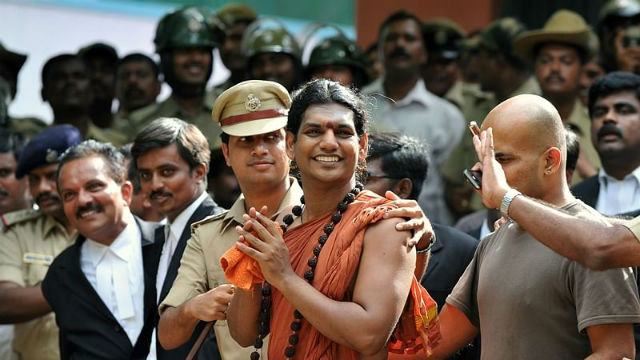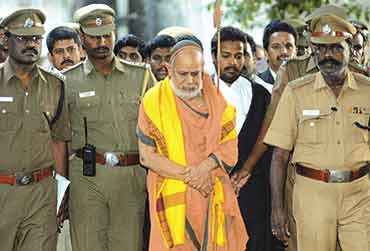- Paramahamsa Nithyananda, a religious guru, was accused of sexual activities with actress Ranjitha, evinced by the bedroom videos that the media virally exposed. His ashrams were beaten up.
- A religious mutt, run by the spiritual guru Kalki Bhagwan, was unveiled encouraging drug trafficking with its devotees.
- Kanchi Jayendra Saraswathi, leader of Sri Sankara Mutt, was charged and jailed for a murder case. But, was later acquitted.
- A spotlight, on the child sexual abuse cases of the Roman Catholic priests, threw light on Pope's consent in appointing them.
 Even though these news bytes, on bogus spiritualists, have become part and parcel of our daily news; still people in masses fall prey to them, which requires research attention.
Even though these news bytes, on bogus spiritualists, have become part and parcel of our daily news; still people in masses fall prey to them, which requires research attention.
By the time, Nithyananda's allegation came forth, Karunanidhi, the then Chief Minister of Tamil Nadu, immediately released a report. In that, he added, “No rational campaign would help these people with goodness". Karunanidhi's report seems ironical and sarcastic, in knowing that his party's rational campaign couldn't even rationalize his party cadres, against their superstitions and astrological beliefs during election campaigns.
It would be a misconception to perceive our media, as really concerned with social issues, when they vehemently exposed those bogus religious saints.
Media, at the outset, may seem to unveil all those scams. But, on probing further, one would agree that it was their revenge against less compensation paid in making peace with the fraudulent. There is no doubt that these media would have some part to hold the stage.
Because Nithyananda or Kalki is no normal proponent of religion but an established multinational entrepreneur, joining hands with those in power, in establishing ashrams worldwide. These religious renouncers are on par with multinational corporates, in wealth. And, they have survived from ancient times, as saffron-clad clairvoyants, to modern globalization, as global spiritual leaders capable of running tech-savvy ashrams and flying between continents.
It is paradoxical to see certain media that once promoted imposters like Nithyananda among masses, turning topsy turvy in exposing their religious fraud. Kumudam, which once supported Nithyananda through its magazine series 'Kathavai Thira Katru Varatum (Let open the door Let the breeze in)', didn't hesitate to release alleged bedroom videos in making money. A later confession was put in the name of ignorance. This shameless tendency wasn't natural but was born out of capitalist's puppetry.
In the name of God, several channels indulge in private spaces of the houses, feeding them with astrology, numerology, palm reading, and several other belief systems. This consumerist behavior severely affects the daily wagers and laborers to dwell deep in thought about some mere abstraction of the future. This 'abstract fear of future' is manipulated by several religions for their existence among the downtrodden labor masses. They are cornered by capitalistic big brother, racially and linguistically putting their rights to livelihood and education in jeopardy.
Labors who risk their life and work, for the well-being of a few bourgeoisie, are highly unconscious about the capitalistic exploitation which puts them in misery. The belief system in god is one such factor that curtails their conscience to be aware of such exploitations. And also, making a compromise with everything which can't be reasoned out, in the name of god.
With this background, people are forced to believe that 'their birth, life, and misery are decided by an ultimate god'. By and large, people consider it to be an axiom.
The belief system of god and fate added with institutionalizing religious dogmas helps in justifying the capitalistic exploitation of common folks. This invariably cements the foundational values of religion as primary institutions.
Along with the work exploitation, under the banner of globalization, people are on the verge of uncertainty in jobs and uncertainty in surviving small scale industries. With this psychological stress, people tend to seek solace in religious gurus for their peace. In that case, poor folks get caught with the ordinary religious gurus whereas rich ones fall prey with modern religious tycoons like Nithyananda.
To launder the money and dump the unaccounted money, that born out of exploitation, these exploitative bourgeoises, and their favorable politicians found money dump-yards with these modern saints.
As a 'catharsis' in letting out the sorrows, reaped out of dumping money, the bourgeoise seeks help from these modern saints. In Delhi, a religious guru named 'Jeev Murad Dwivedi' faked people by doing yoga, meditation, and discourse in the morning and entertaining prostitution in the late evening. It was surprising to find that most of the women, caught with such activities, belonged to the literate middle and upper class of society.
 These modern religious imposters have their upper hand with the people from such vulnerable backgrounds. The same applies to wealthy foreign devotees too. This is how these imposters originate.
These modern religious imposters have their upper hand with the people from such vulnerable backgrounds. The same applies to wealthy foreign devotees too. This is how these imposters originate.
They simply advocate doing our daily habitual chores with fellow beings, being kind with financially unprivileged, breathing exercise with meditation as a remedy for the depression from work burden, opening up a deep conversation, shouting out loud, dancing, and asking them to think with fancy names like 'ecstasy' and' happiness'. These are the list of chores that these modern religious saints engage them along with some discourses, for which they charge in lakhs.
Most of the IT employees, under depression, are now easily falling prey for the modern religious imposters. These exercises are of no value before the act of spending some time with children and family members, which has a great effect on the mental balance. Since they interact mostly with modern gadgets, they find difficulty in speaking with human beings! They became machines by interacting with these gadgets and they hardly find time for this. So, they give a specific time to be used by those modern gurus.
Swami Sukhabodhananda, who wrote "Mind, Relax Please!", a weekly series in Ananda Vikatan followed this motive. After the global economic crisis of 2009, there was a sudden glitch of depression with workers. For which, they sought the television comedy series, giving huge success, under the shadow of globalization. The commercial success of films, based on village stories, were obliged to the same globalization that displaced our youngsters out of hometowns to cities, by destroying the villages. They had a 'cathartic effect' when they saw village life on the silver screen.
This is the worst effect that globalization had upon the exploited and depressed people who badly need a religious guru, guiding them to be kind and compassionate with others.
These religious renouncers, along with their exercises, creatively plant consumeristic culture and ideas of globalization in the minds of people. Media encourages these imposters with those hidden motives, that is desired by the ruled and the globalists.
Globalization advises, 'Think with the modern institution of society in mind'. Even these religious imposters advise the same.
Jaggi Vasudev directly attacks in a public book release by stating, "Youngsters should not be motivated by the words of Che Guevara, 'If you rebel against injustice, we both are comrades!' You shouldn't take him as a role model".
Jaggi Vasudev organized an event by planting trees to save earth from global warming. But he hesitates to speak the truth, that global warming was a byproduct of capitalist's exploitation of natural resources. Fighting against it is, according to him, a "violent concept".
These religious fakers try to substantiate the capitalist's narrow world view, that advocates individualism, by curtailing struggles and the high benefits of social formation and co-operation. They mold these ideas into different fancy terms like individual obedience, instinct, and self-thinking.
Globalized companies demand extreme consumerism for their huge profit. The same is laid down by the modern religious imposters as a quotation, 'desire for everything'.
Globalization advocates uncontrolled sexual relationships and practices with the term 'sexual freedom'. Which has a hidden motive, to break away from the family structures, by which they have a large number of customers to consume. Modern imposters modify them as 'think about you; everything starts with you'. Similarly, Sri Sri Ravi Shankar advises his followers, "Don't try to change, accept as it is".
There is a lot of political support that gets added along with the enormous institutional wealth of these imposters. Also, the stature of these religious saints has gone up from national politics, intermediated by fakers like Chandraswami and Jeyenthirar, to international politics, intermediated by persons like Sri Sri Ravi Shankar.
Though they claim themselves to be secular at the outset, they are nothing but the hidden bigots of Hindutva nationalism. This is evident with their direct political activities apart from their support given to Hinduism and Hindi language.
Sri Sri Ravishankar masks Ramar bridge to stand against the Sethusamudram canal project. Also, he condemns reservation. When Nithyananda absconded, the leader of the Hindu fundamentalist party 'Shiv Sena' met with the press.
We should probe these crimes, by the modern religious frauds, not as individual crimes but in relation to the social backdrop to convict the true criminal.
Ordinary people work for a hike in salary along with tensions like untimely works, burdened workloads, and the insecurity in losing jobs. The discourses that these modern religious gurus prescribe are like toxic drugs, given in doses to immediately cure the losses in family relationships, mental well-being, and active social life. The successful growth of these religious imposters lies in their tactics, to focus on effects rather than removing the causes of such burdens.
The right way for people's liberation lies in understanding and struggling against such causes.
Written by K. Arunabharathi
Translated by Ganesh Hariramana
(This article was originally published in a Tamil Magazine 'Tamil Desiya Tamilar Kannottam', April 2010)

